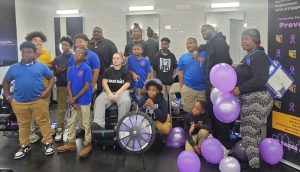By: Michele Hong
CFCC has been operating the Tackling Chronic Absenteeism Project (TCAP) (originally the Truancy Court Program) since 2005. In recent years, the TCAP Team has observed higher rates of engagement from our middle school students. After reviewing the data and undergoing a comprehensive strategic planning process, CFCC decided to embark on a new Middle School Model. During the designing process, CFCC and the TCAP team met with representatives from the Baltimore City Public Schools’ (BCPS) Attendance Office on multiple occasions, as well as one of the Judges who oversees the Truancy Docket in Baltimore City District Court, attorneys from the Office of the Public Defender, and attorneys from the States Attorney’s Office. We shared our ideas and received positive feedback from everyone we engaged.
After a collaborative strategic planning process, TCAP elected to focus on the middle school years, with the hope that our students will be better positioned to be accepted into their first choice high school and succeed there. In Baltimore City, students do not attend a locally zoned school, but rather they must apply to one of the many high schools throughout the city, some of which require high composite scores, portfolio submissions, and/or a school lottery to gain entrance. Moreover, some high schools focus on STEM, International Baccalaureate programming, and/or the Arts, while other schools provide vocational training in areas such as nursing, criminal justice, and early childhood education. As a result, navigating the School Choice process can be a difficult and unwieldy process for students and families, causing undue stress. Getting into a high school that is a good fit both geographically and academically can be critical to academic success and high school graduation. Ninth graders typically post the highest rates of chronic absenteeism. To address these concerns, TCAP hopes to provide the supports needed for students to make successful School Choice selections and thrive in high school.
This school year, TCAP is serving approximately 60 sixth graders and their families in four Baltimore City Public Schools: Booker T. Washington Middle School (BTW), Collington Square Elementary/Middle School (Collington Square), Katherine Johnson Global Academy (KJGA), and Maree G. Farring Elementary/Middle School (MGF). CFCC and the TCAP Team met representatives from all four schools throughout the summer to garner input in designing a curriculum suitable for middle school students. Suggestions included greater focus on teaching students how to communicate and advocate for themselves, addressing bullying, and focusing on healthy relationships.

TCAP Building Healthy Relationships Workshop
In the end, we designed a curriculum that includes modules focused on Academic Success and Planning for the Future, Building Healthy Relationships, Trauma/ Stress/ Mindfulness, Civic Engagement, and Financial Acuity. Each module spans approximately three weeks and begins with a restorative circle that introduces the topic, followed by a facilitated workshop, and concludes with a discussion on how to apply the lessons learned into daily life. When possible, the TCAP Team collaborated with the community to support the programming. We hope to build off the five focus areas in the Spring semester.
In furtherance of the new Middle School Model, this past Fall semester, the TCAP facilitated the following workshops described below. Unless a specific school is mentioned, each workshop was facilitated at all four schools.
- Our TCAP Program Manager, Rohina Zavala, kicked off the school year facilitating a workshop around Academic Success. As part of her workshop, she provided each student with their own academic planner and modeled how to use them. Throughout the Fall semester the TCAP Team did surprise planner checks. Students who had used their planner to note homework assignments, quizzes, or events were rewarded with small prizes.
- CFCC’s Student Fellow, Sophie Alpert (a third year law student), facilitated a workshop on civic engagement. Building off the current election, Sophie walked students through the history of the right to vote, the various positions currently up for election (e.g., U.S. President, Maryland U.S. Senator, state senators and delegates), and what role students can play to promote civic engagement. We plan to build off this workshop in the Spring semester, allowing students to hold their own mock elections.
- Ashley Rivera, Intimate Partner Violence Prevention Court Liaison with the Mayor’s Office of Neighborhood Safety and Engagement (MONSE) facilitated a workshop on Healthy Relationships. These workshops are part of the One Love Foundation’s efforts to end relationship abuse, empowering “young people with tools and resources to see the signs of healthy and unhealthy relationships and bring life-saving prevention education to their communities.”
- CFCC Executive Director, Aubrey Edwards-Luce, facilitated a workshop on recognizing stress and trauma responses when they arise, and practicing mindfulness to address trauma. Aubrey provided students with skills such as breathing exercises to help them identify and address trauma responses when they occur.
- Students from the Baltimore Polytechnic Institute who run a program called, “Global Gardens” facilitated a workshop at KJGA on the environment and sustainability. As part of the workshop, students were invited to plant seeds, while learning what role they can play to help save the environment.

TCAP Barbershop Event
In addition to our programming offered at each of the four schools, in support of Domestic Violence month, CFCC partnered with a local barbershop, MONSE, and BTW for a special Barbershop Event focused on teaching young men about healthy relationships. All participating students received a free haircut, while learning about supporting healthy relationships and understanding domestic violence. We are hoping to partner again in the Spring semester to facilitate a similar program for young women at BTW.
Lastly, this year CFCC’s annual symposium focused on juvenile justice, “Keeping Youth in Community: Policies, Practices, and Programs to Promote Youth Justice.” Nate Balis, the director of the Juvenile Justice Strategy Group at the Annie E. Casey Foundation, provided the keynote address, focusing on what role community can play to build a better juvenile justice system. As a prelude to the symposium,
CFCC hosted an Art and Poetry Showcase which allowed attendees to learn what programs and policies youth desire to see in a system that promotes justice and accountability. Facilitated by TCAP Mentor, Arion Alston, the showcase was led by former TCAP students from Collington Square, along with youth from the Choice
Program who were impacted by the juvenile justice system. The students used poetry and personal narratives to share their perspectives and experiences on justice, community, and accountability.
For the Spring semester, TCAP is bringing representatives from a local credit union to the schools to teach students about financial literacy. The team will also re-visit the topics covered in Fall semester to reinforce and build off of lessons learned, with many of our past partners returning. Lastly, UBalt Law’s new DEIB Director will partner with TCAP to provide trainings both for our staff, as well as facilitate workshops at each of our four schools.